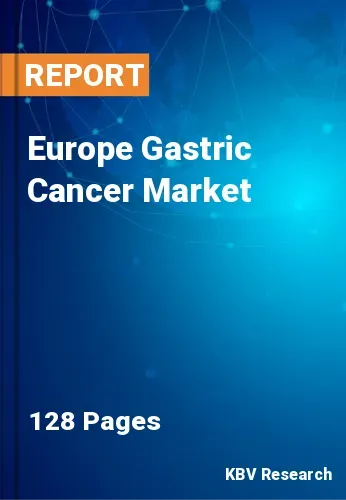The Europe Gastric Cancer Market would witness market growth of 16.9% CAGR during the forecast period (2023-2029).
Gastric cancer, particularly tumors in the lower stomach region, appears mostly caused by infection with Helicobacter pylori (H pylori) bacteria. Atrophic gastritis and other precancerous alterations to the stomach's inner lining may result after a long-term infection with this bacterium. Being overweight or obese is associated with a higher chance of developing this type of cancer, which affects the upper portion of the stomach next to the esophagus.
People are more inclined to seek medical attention and get examined for the disease as they become more aware of the risk factors linked to gastric cancer, like tobacco use, diet, and family history. With growing awareness, more cases of gastric cancer can be identified at an earlier stage, which is essential for effective treatment and better patient outcomes. It is anticipated that this will lead to a rise in demand for diagnostic and therapeutic alternatives, such as medication, surgery, and radiation therapy. As a result, there will be more participants in the gastric cancer market in the future as healthcare awareness rises.
21% of adults in England regularly consume alcohol at levels that increase their risk of sickness (higher-risk drinkers and drinkers at increased risk). Men (25 and 11%, respectively) were found to consume alcohol in harmful amounts more than twice as often as women (on average). Similar to this, it was discovered that 5% of men and 3% of women drank alcohol at amounts associated with higher risks (5% consumed over 50 units and 3% consumed over 35 units, respectively). Adults in the least deprived areas had a lower likelihood than those in the least deprived areas of exceeding 14 units of alcohol in a typical week. Although younger people are less likely to drink than any other age group, data indicate that on their busiest drinking day, their intake is more likely to be higher than that of older people.
The Germany market dominated the Europe Gastric Cancer Market by Country in 2022 and would continue to be a dominant market till 2029; thereby, achieving a market value of $456 million by 2029. The UK market is anticipated to grow at a CAGR of 15.9% during (2023 - 2029). Additionally, The France market would experience a CAGR of 17.8% during (2023 - 2029).
Based on Route of Administration, the market is segmented into Injectable and Oral. Based on Treatment Type, the market is segmented into Chemotherapy, Targeted Therapy, Immunotherapy, and Radiation Therapy & Surgery. Based on Disease Type, the market is segmented into Adenocarcinoma, Carcinoid Tumor, Gastrointestinal Stromal Tumor, Lymphoma and Others. Based on Distribution Channel, the market is segmented into Specialty & Retail Pharmacies, Hospital Pharmacies, and Others. Based on Drug Class, the market is segmented into PD-1/PD-L1 Inhibitors, HER2 Antagonists, VEGFR2 Antagonists and Others. Based on countries, the market is segmented into Germany, UK, France, Russia, Spain, Italy, and Rest of Europe.
Free Valuable Insights: The Worldwide Gastric Cancer Market is Projected to reach USD 6.9 Billion by 2029, at a CAGR of 17.6%
The market research report covers the analysis of key stake holders of the market. Key companies profiled in the report include Novartis AG, Pfizer, Inc., Viatris, Inc. (Mylan N.V.), F. Hoffmann-La Roche Ltd., Eli Lilly And Company, Merck & Co., Inc., Teva Pharmaceuticals Industries Ltd., Bristol Myers Squibb Company, Celltrion Healthcare Co., Ltd., and Samsung Biologics Co., Ltd. (Samsung Bioepis Co., Ltd.).
By Route of Administration
By Treatment Type
By Disease Type
By Distribution Channel
By Drug Class
By Country

Our team of dedicated experts can provide you with attractive expansion opportunities for your business.

